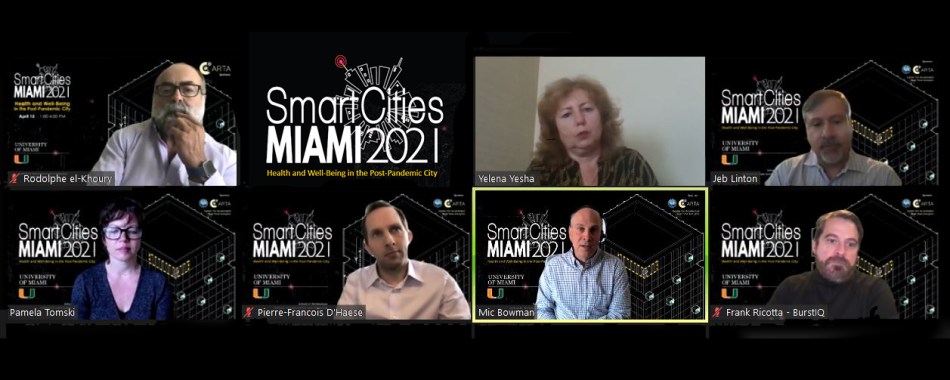
Using Data and Digital Tools to Improve Health and…
From mixed-reality home experiences to community-wide disease alerts, leading-edge health technology can help individuals, providers, health systems, government agencies, and care providers meet the challenges of the next decade. Innovative digital approaches to improving “Health and Well-Being in the Post-Pandemic City” were highlighted at Smart Cities MIAMI 2021, a virtual conference on April 15 hosted by the University of Miami Institute for Data Science and Computing (IDSC) in partnership with the School of Architecture.
“UM is committed to interdisciplinary research with IDSC playing a key collaborative role,” said Rodolphe el-Khoury, Dean of the School of Architecture. He welcomed attendees to the fourth annual Smart Cities MIAMI Conference, which was sponsored by the National Science Foundation’s Center for Accelerated Real Time Analytics (CARTA). “Despite today’s challenging circumstances, this is an important moment for advancing healthcare through the smart city concept.”

“As we increase connectivity, the attack surface expands exponentially.”
Security and Digital Transformation
Keynote Speaker Michael Mylrea, Senior Technical Advisor to CARTA, discussed blockchain technology in his talk, “Security and Digital Transformation Opportunities and Challenges for Post-Pandemic Cities.”
Noting that security, interoperability, and privacy have been issues in health IT for decades, Mylrea said the challenges have escalated with the acceleration of medical sensors and devices connected to the Internet of things (IoT). “As we increase connectivity, the attack surface expands exponentially,” he said. “We also need to break down data silos to apply machine learning and artificial intelligence effectively.”
For healthcare organizations, blockchain can improve data security, storage, and management, while providing real-time actionable information, he said. Mylrea cited an initiative involving UM and GE Global Research, applying a blockchain-based application to protect visitors, passengers, and employees at Albany International Airport in New York. “This is not a panacea, but it greatly improved tracing ability,” he said.

“Addressing health disparities starts with data.”
Healthcare in the Smart City
Yelena Yesha, PhD, Innovation Officer and Head of International Relations for IDSC, moderated the initial panel discussion on “Healthcare in the Smart City” with Jeb Linton, CTO, Partner Ecosystem and Cognitive Security at IBM Watson Cloud; Pamela Tomski, Analytics Advisor with SAS Institute, Pierre-Francois D’Haese, CEO at Neurotargeting and Director of Digital Health and Imaging Analytics at Rockefeller Neuroscience Institute; Mic Bowman, Senior Engineer, Intel Labs; and Frank Ricotta, CEO, BurstIQ.
The panelists discussed the use of various encryption tools to protect privacy, as well as the use of “federated learning,” which makes it possible to train an AI system collaboratively without sharing their data. “Clinicians in different hospitals could share brain tumor images,” said Linton.
Other digital healthcare issues include the ownership of data produced by smart wearables and medical devices, as well as the importance of governance—avoiding biases when training AI algorithms and considering all the ramifications of new technology.
“We have done predictive modeling for state and local government to help to identify areas with more vulnerable residents to improve health outcomes,” said Tomski. “Addressing health disparities starts with data.”

A Smart Home Health Hub
A collaborative UM team is developing a concept called a “smart home health hub” that could change everyday lives. In the second panel session, the “University of Miami Innovation Showcase,” Dean el-Khoury and Dr. Yesha led a discussion on the initiative, which can provide an interactive, mixed reality experience with real-time connections to a physician.
“It’s the microcosm of the entire system because it encapsulates and concentrates those four main functions: monitoring, treating, communicating, and data analysis,” said el-Khoury. “We think of it as the Swiss Army knife of sensors, jampacked with everything we are already developing. It can be customized and connected to appliances you already may have.”
Yesha added that the smart home health hub is not meant to replace medical care or medical professionals. “Our team is looking at the integration of state-of-the-art technologies in the home, with the data acquisition and handling done in a protective way, then communicating with the physician and the healthcare providers in a seamless way,” she said. “This is a totally novel concept.”
The UM team members working on this project include Nicholas Tsinoremas, PhD, Vice Provost for Research Computing and Data and Founding Director of IDSC; Sylvia Daunert, PharmD, PhD, the Lucille P. Markey Chair of Biochemistry and Molecular Biology at the Miller School of Medicine; Sapna Deo, PhD, Associate Professor and Biochemistry and Molecular Biology Graduate Program Director at the Miller School of Medicine; and Leonidas Bachas, PhD, Dean of the College of Arts and Sciences.

“Healthcare is moving towards the home,” said Tsinoremas, who looks forward to working with industry partners. “This is an opportunity to have a ‘candy store’ of all the data in one place if you will.”
In closing the second panel session, Tsinoremas and Yesha underscored how important having a smart home health hub will be for individuals in a post-pandemic world.

Your Digital Twin
Mark Wolff, Chief Health Analytics Strategist, SAS Institute, gave the closing talk, “Your Digital Twin Will See You Now—How the Internet of Medical Things and Edge Analytics are Changing Health Care.”
Wolff explained how massive data sets, powerful software applications, and the growth of telehealth services are changing how medicine is practiced. “Doctors can utilize digital tools to guide their diagnosis without having to see the patient in person,” he said, adding that in the future a patient’s avatar could visit a digital version of the doctor’s office instead of making a physical trip.
“We can use streaming data to model functions of the heart, lungs, and other organs,” Wolff said. “So, when we look in a smart mirror we can send that data to a provider, and be alerted to any issues. This is another example of how digital transformations make it easier for people to conveniently access the services they need.”
Story by Richard Westlund
______________
CATCH THE REPLAY: Watch Smart Cities MIAMI 2021 in its entirety . . .